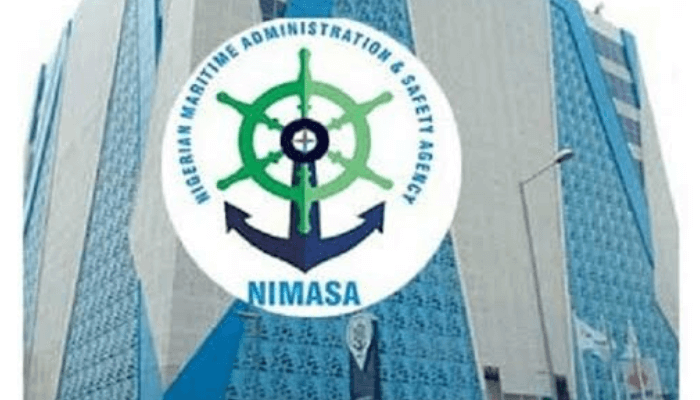The Nigerian Maritime Administration and Safety Agency (NIMASA) has stated that its newly introduced Maritime Labour e-platform has been assessed to operate at a level that meets global standards for maritime labour administration, worker documentation, and regulatory oversight. The agency said the platform represents a major step in its efforts to digitalise critical processes, strengthen maritime governance, and enhance the welfare of Nigerian seafarers and dockworkers in line with international conventions governing maritime labour activities.
NIMASA explained that the development of the e-platform was driven by the need to eliminate delays and inefficiencies that have long characterised the manual handling of maritime labour documentation. According to the agency, the new system simplifies the registration of maritime workers, improves the verification of credentials, and enhances compliance monitoring for employers operating within Nigeria’s maritime domain. It added that the platform was built to integrate seamlessly with global digital standards used by maritime regulators around the world, ensuring that Nigerian maritime workers and operators can engage more effectively in international maritime operations.

The agency further noted that the e-platform offers an automated interface that allows seafarers to process their documents without the stress and long waiting periods often associated with physical submission. Through the platform, workers can apply for certifications, renew their documents, update their employment information, and verify their credentials using a secure, centralised system. NIMASA stated that the platform is also equipped to detect irregularities, track compliance records, and monitor the activities of licensed maritime labour employers, thereby promoting transparency across the sector. The digital tool, according to the agency, ensures that Nigeria keeps pace with the evolving technological requirements of the global maritime industry.
Officials of the agency emphasised that the platform was designed to reduce opportunities for unethical practices and curb the exploitation of maritime workers. By reducing physical interaction and allowing for direct electronic processing, the new system minimises human interference that often leads to extortion, document manipulation or the issuance of unauthorised certifications. NIMASA said this clear shift to a digital, transparent process promotes fairness, accountability, and improved protection for maritime labour personnel in Nigeria.
Beyond its impact on documentation, the agency highlighted the platform’s role in strengthening data management across the maritime labour space. It explained that the system allows NIMASA to maintain a comprehensive and up-to-date database of seafarers and dockworkers, including their qualifications, employment history, and compliance status. This, the agency noted, makes it easier to determine workforce needs, assess training gaps, and support policy decisions that will promote a more competitive and responsive maritime labour market. With more accurate data, NIMASA believes Nigeria can better position itself to attract foreign investment and improve its contribution to the global supply of skilled maritime professionals.
The agency also underscored that the platform was built in alignment with the provisions of the Maritime Labour Convention and other international regulations that govern the welfare, safety and rights of maritime workers. According to NIMASA, meeting these global benchmarks is essential to improving Nigeria’s credibility within the international shipping community, especially as the country continues to expand its shipping activities, port operations and maritime workforce. The digital system, it said, gives foreign partners and international organisations greater confidence in Nigeria’s capacity to regulate and protect its maritime labour force effectively.
NIMASA added that the deployment of the e-platform is part of a broader digital transformation initiative aimed at upgrading maritime safety management, port state control operations, seafarer training, ship registration procedures, and maritime security frameworks. The agency said that digitalisation remains a core priority because the maritime industry has become increasingly dependent on technology for efficiency, safety and competitiveness. By adopting global best practices in digital administration, NIMASA believes Nigeria will be better positioned to maximise the benefits of the blue economy and strengthen its role both regionally and internationally.
Industry stakeholders have welcomed the initiative, describing it as a long-awaited reform. Maritime labour employers, training institutions and seafarer unions have expressed optimism that the platform will eliminate the long-standing bottlenecks that previously discouraged many young Nigerians from pursuing maritime careers. They believe that the improved transparency and predictable timelines offered by the system will make it easier for workers to plan their careers, access training opportunities and secure employment in a sector that is becoming increasingly competitive worldwide.
NIMASA reiterated its commitment to continuous improvement, stating that the platform will be expanded with additional features as the needs of the maritime workforce evolve. The agency said it will continue to engage stakeholders to gather feedback and ensure the system remains user-friendly, secure, and fully compliant with global standards. It maintained that the deployment of the e-platform marks a major milestone in Nigeria’s drive to modernise its maritime sector and strengthen labour administration.
NIMASA concluded that with the new system now fully operational, Nigeria is better positioned to enhance the welfare, productivity and global competitiveness of its maritime workers. The agency expressed confidence that the digital platform will contribute significantly to building a more transparent, efficient and internationally recognised maritime labour administration framework for the country.
Support InfoStride News' Credible Journalism: Only credible journalism can guarantee a fair, accountable and transparent society, including democracy and government. It involves a lot of efforts and money. We need your support. Click here to Donate
